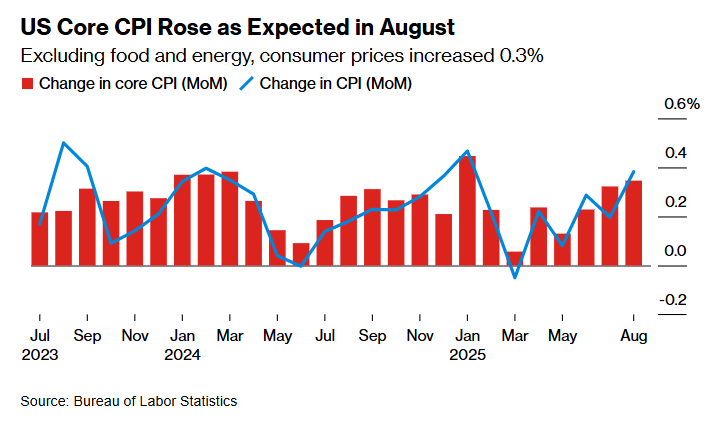- US consumer inflation increased by 0.4%, beating the forecast of a 0.3% increase.
- Market participants expect the Fed to cut interest rates by 25-bps.
- The Bank of England will likely keep interest rates unchanged due to high inflation.
Currency futures gained on Monday as the dollar weakened ahead of an expected Fed rate cut this week. At the same time, market participants were looking forward to central bank meetings in Japan, Canada, and the UK.

US core CPI (Source: Bureau of Labor Statistics)
The greenback fluctuated last week amid mixed economic signals. However, Fed rate cut expectations remained elevated. The major report showed consumer inflation increased by 0.4%, beating the forecast of a 0.3% increase. Meanwhile, the annual and core figures increased as expected. The spike briefly supported Treasury yields and the dollar.
However, another report on Thursday revealed that unemployment claims jumped to 263,000, compared to the forecast of 235,000. The poor numbers overshadowed the inflation report and weighed on the dollar. It highlighted a rapid decline in the labor market that increases pressure on the US central bank to lower borrowing costs.
Meanwhile, policymakers have mostly accepted that tariffs have had a limited impact on price pressure. Therefore, their focus has shifted more towards growth.
This week, market participants expect the Fed to cut interest rates by 25-bps. The move itself could have little impact on the dollar as it has already been priced in. However, traders will also focus on the messaging and the tone during the meeting. If policymakers show great concern about the labor market, it could weigh on the dollar. At the same time, there is a chance of a bigger-than-expected rate cut.
Furthermore, the Bank of Canada will likely also cut rates by 25-bps. Canada’s labor market has weakened significantly, raising concerns about the economy. On the other hand, the Bank of England will likely keep interest rates unchanged due to high inflation. This has given the pound an edge over the dollar.
Finally, traders will focus on the Bank of Japan policy meeting, where policymakers will likely hold rates. However, the yen remains vulnerable due to political uncertainty in Japan since the resignation of Prime Minister Shigeru Ishiba.
“The JPY continues to underperform in the near-term, undermined by the pick-up in political uncertainty in Japan after PM Ishiba resigned,” said analysts at MUFG in a note.
“The BOJ would have to provide a signal that a rate hike could be delivered as soon as next month to trigger a reversal of JPY weakness.”




